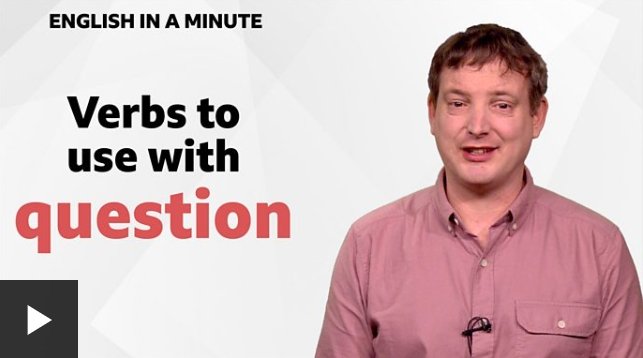Introduction
Questions are the things that we say when we want to know something. There are some words that we often use together. These are called collocations. Learn some of the verbs that we often use with the noun ‘question’ with Phil.
Common collocations with ‘question’
ask a question
If you ask a question, you say it to someone, and want them to answer you.
- Can I ask where you live? I need to put your address on this form.
have a question
If you have a question, then there is something that you want to know, or find out from someone.
- I have some questions about this job. What happens if I can only work part-time? How much is the pay?
fire questions
If you fire questions at someone, you ask them lots of questions quickly.
- The professor was new and he didn’t expect the students to fire so many difficult questions at him at the end of the lecture. He hadn’t prepared, but managed to answer most of them.
frame a question
Framing a question is choosing words carefully to make a question. People frame questions carefully if there is something very specific that they want to know.
- To be a successful lawyer, you need to know how to frame questions to get the information you need. Some witnesses don’t want to tell you everything they know.
phrase a question
The way you phrase a question is the exact words that you use to ask it. You might need to carefully phrase a question if you are asking about a difficult subject, and you don’t want to hurt people’s feelings.
- This is going to sound bad, so I need to phrase my questions carefully. I want to ask about your divorce.
field questions
Fielding questions is when you answer lots of difficult questions. In cricket or baseball, fielding means catching the ball, and returning it to the bowler. People field questions in a similar way.
- After the story in the paper was published, the disgraced politician fielded questions from the press. There were hundreds of reporters on his doorstep.
evade a question
Someone evades a question when they try not to answer it. They might try to change the subject, or answer a different question.
- The thief was trying to evade the questions from the police by giving vague and unclear answers.
avoid a question
Avoid a question means the same as evade a question.
- I asked my son where he was going, but he kept trying to avoid my questions. I couldn’t get a straight answer from him.
TRANSCRIPT
Note: This is not a word-for-word transcript.
Phil
Here’s a question for you: what verbs can we use with ‘question’?
We have questions. We can also fire questions at someone – that means ask lots of questions quickly.
I have a question for you. What did you do yesterday?
She wasn’t prepared for the interviewers to fire questions at her like that.
Framing a question, or phrasing a question, means thinking about the words you use.
You’re framing these questions to make me look bad!
To ask about personal problems, you need to phrase your questions carefully.
We answer questions, but we also field questions if there are a lot of them, and they’re difficult, and we evade questions if we try to avoid them.
He fielded the angry customers’ questions about the faulty products.
Don’t change the subject. You’re just trying to evade the question.
You can frame or phrase your questions, fire them at someone, and hope they don’t evade them.
